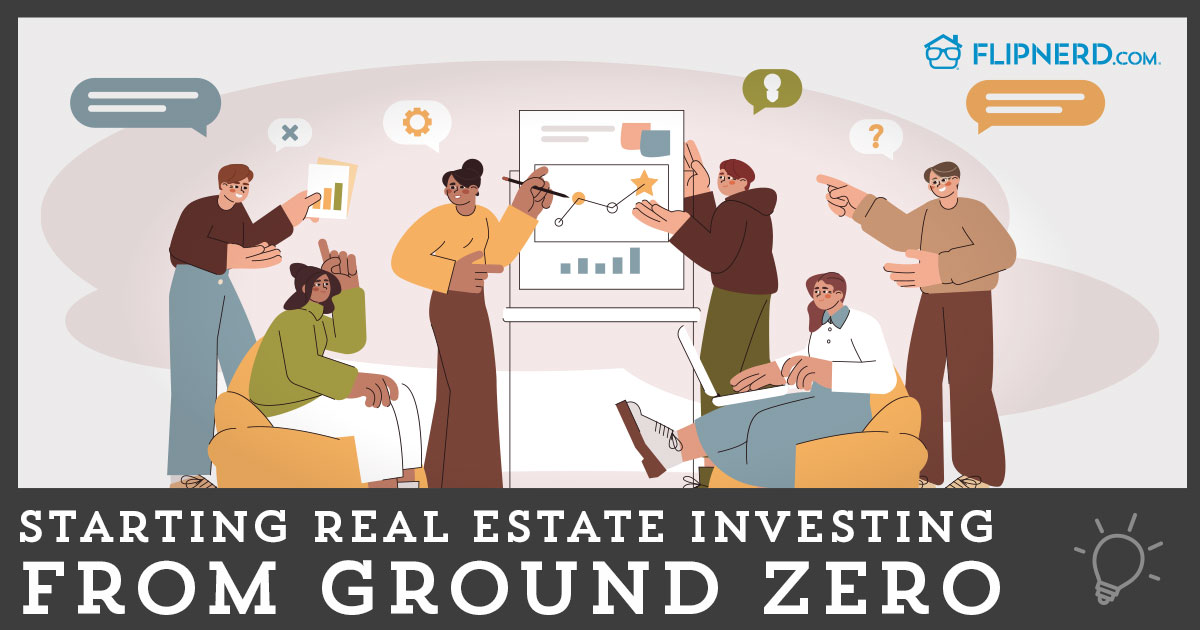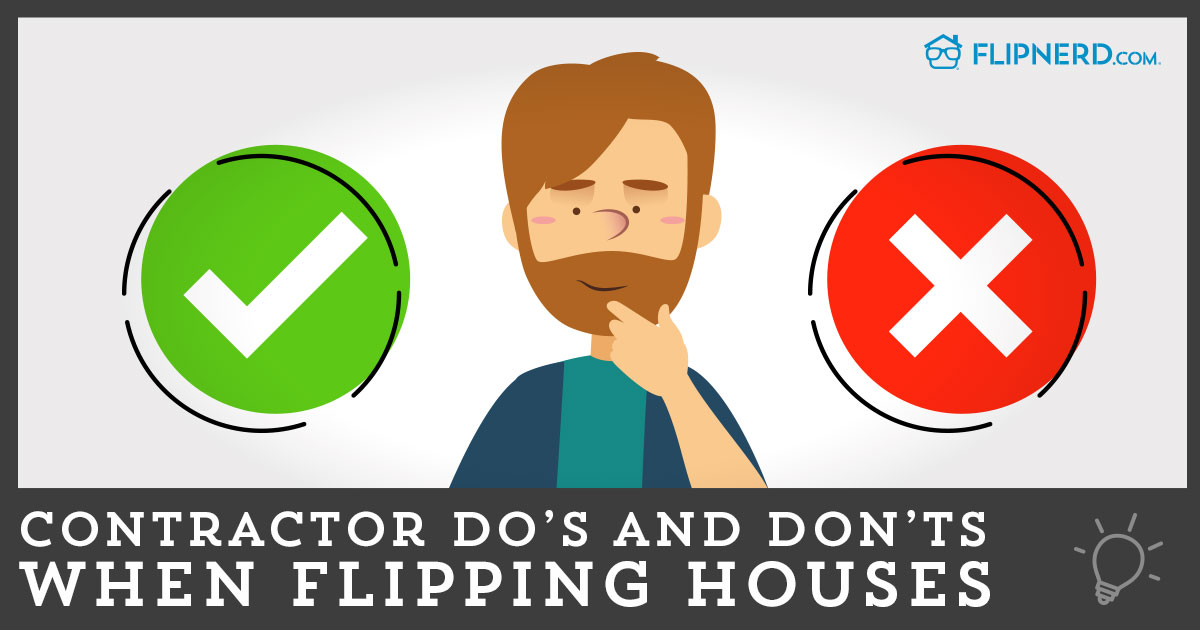By now, most know that owning rental properties is a great way to create cash flow and build long-term wealth. However, there’s a massive gap between knowing rentals are a good vehicle for building wealth, deciding in your mind that you want to buy rentals, and of course the most difficult part, actually executing on that plan!
Truthfully, even if you’re able to execute your plan of purchasing rentals, it’s very possible that this is where the nightmare begins. Similar to having children, there’s a whole lot that “they” don’t tell you. Yeah, you know you’ll have to deal with dirty diapers, but there’s a lot more to the story that they fail to mention!
Don’t get me wrong… I’m an advocate for owning rental properties and generating cash flowing assets.
In this article, we’re going to talk about how to get you from “I’m interested in rentals” to “I own rentals and am prepared for whatever comes my way.”
So, let’s get some of the obvious out of the way.
Pros and Cons of Owning Rental Properties
Pros to Owning Rentals
This is well documented, and while you may still have a lot to learn, you likely know that some of the biggest benefits include:
- Cash Flow – If purchased ‘right’ (we’ll talk more about this later), your properties should be cash flow positive from day one.
- Long-Term Equity Growth – Every single month, your tenants are paying down your debt, which means your equity in the property is growing. This is your long-term wealth generation machine at work.
- Appreciation – We advise people to not ‘count’ on appreciation, but it’s a very real thing. Truthfully, some of the best markets to build rental portfolios in generally have relatively low price appreciation, but if you’re using leverage at all (which you should be!), even if you put 20% down… each 1% in price increase for you is equal to a 5% return.
I believe that every property you buy should cash flow. Debt reduction is powerful, and if there is meaningful appreciation, that’s the icing on the cake (but don’t buy on the assumption that appreciation will be there).
Cons to Owning Rentals
This depends on quite a few things, some of which we’ll discuss throughout this article. A couple of the biggies are:
1. Property Management – Tenants, Toilets, and Termites
Are you managing yourself?
If you are managing yourself and managing less than, say, 50 properties… STOP! I know some really good property managers, and even THEY don’t like the management side. They have figured out how to outsource most tasks to employees so they can focus on ‘running the business’ (or buying more properties for themselves).
Unless you’re an actual property manager… your business is NOT “management”.
For most investors, your time is better spent doing almost anything other than property management.
Most self-manage to ‘save money’, but it’s a losing proposition. There’s no way you’ll ever be as efficient as someone managing hundreds of rentals, with many more resources and specialists on their team.
Plus – PLEASE don’t forget about the opportunity cost of your time! Your time is extremely valuable… don’t discount it.
Did you know? 1/3 homes in America are owned by real estate investors.
2. City/County Governments – there’s a lot of pressure right now on making things ‘worse’ for property owners.
I hear stories from all across the country where tenant rights groups (or advocates) are gaining influence and getting laws passed that make things worse/more expensive for property owners.
I’m not professing that tenants shouldn’t have rights, but I am a believer in the free market. If you don’t like my property or my price, don’t rent from me.
In my primary market, for example, Dallas, TX, the city just passed some extreme new laws for landlords that border on being unconstitutional.
Most taxing authorities don’t understand that 1/3 of homes in America are owned by real estate investors. Most of which, pay their taxes like clockwork and have a vested interest in improving property values.
That being said, many city and county governments are looking for revenue – and there’s a target on your back.
Let’s not get derailed from our purpose here… but dealing with taxing authorities and city governments isn’t generally a ‘fun’ thing.
Financially, the Pros clearly outweigh the Cons for rental properties.
How to Finance Your Rentals
Until you own rental properties, you often don’t realize that your run of the mill retail bank can’t help you. The problem is, they won’t tell you they can’t help you until you are several weeks into believing that your funding is coming.
Big banks (Chase, Wells Fargo, etc.) don’t ‘get us’ as real estate investors. But, the friendly retail salespeople in your local branch will do their best to earn your business. Don’t fall for it… it won’t end well.
It’s important that you’re dealing with a lender that ONLY works with real estate investors. To get deals done, you need to minimize drama. Heck, if you’re financing falls through in this hot market, it’s likely that you’ll lose the deal completely.
This is such an important topic that we created a FREE Guide for you, called the “4 Minute Rental Financing Breakdown” – download it for free here.
The financing you often need comes down to whether your property is ‘stabilized’. By stabilized, I mean it doesn’t need work (or has work to be done that you won’t need a loan for), or you don’t need a loan for purchasing the property AND for repairing it. In addition, how many rental properties you have financed makes a difference (Do you have more than 10?).
Bridge Financing or Portfolio Loans
If you need short-term lending to rehab a property before you turn it into a long-term hold, or if you already have more than 10 properties… you need a different kind of lender. Because we at FlipNerd are also investors, and because we listened to our ~60,000 subscribers, we found a lender that would help our members fund their deals.
You can learn more about FlipFunds.com, including applying for a loan, refinancing a loan, or even obtaining a pre-approval letter right here:
So… what do you do next?
How to Find Rental Properties
You have an interest in owning rentals, and some direction on how to fund deals… but where the heck do you find deals?
If you’re new to this game, you may be thinking, “I’ll call a real estate agent”. That’s likely not the best solution. (My wife is an agent… so it’s not my intention to offend agents here.)
But – most Realtors do not really understand investors.
Personally, I’ve bought hundreds of houses and mentored investors that have bought thousands of houses and my guess is that less than 5% came off the MLS or through agents.
The bigger challenge with buying off the MLS (by the way… MLS = Multiple Listing Service, where Realtors ‘list’ properties) is that, especially in a market as hot as the one we’re in now, it’s nearly impossible to get a ‘deal’. Most houses are selling for top dollar, very quickly.
To put into perspective, I sell almost every house I buy (rehabs, wholesales, etc.) on the MLS… but I don’t acquire properties there.
So, where do you find deals?
It depends.
As an active investor that is looking at deals every day (my team is), I buy direct. I have a large advertising budget to market direct to sellers, who call my office. I have a team to take calls, go on appointments, and make offers every day, etc. This doesn’t mean it’s right for YOU.
I’m set up as a wholesale buyer. We spend a lot of effort and resources to buy at deep prices. But consider that if I sell a property for $20,000 more than I paid for it… I had expenses to get that done. Advertising, staff, insurance, etc.
Unless you want to run a wholesale operation (which is harder to do these days!), you may be much better off buying from an investor.
However, even at this point…if you buy from a ‘wholesaler’ to keep as a rental, you’ll be responsible for rehabbing the property. Yes, another JOB! And, if the property isn’t in your market (or you don’t have time to oversee the rehab), it’ll soak up a ton of your time trying to manage from afar, and cause you a ton of grief.
But there’s a better way…
Despite buying hundreds of houses and building a rental portfolio the ‘hard way’, I’ve come to appreciate an easier way to buy and grow a rental portfolio: Turn-Key Rentals.
What is ‘Turn-Key’?
There are various ‘flavors’, but generally, it means you’re buying rentals that are either “done for you” or someone is holding your hand to get it done much more efficiently.
Truthfully, rentals are often talked about as being ‘passive’, but I can assure you, if you’re finding the deals yourself, playing any role in the rehab process, or doing ANY management yourself… you’re FAR from passive.
“Risk comes from not knowing what you’re doing.” – Warren Buffett
Are Rentals “Passive” Investments?
Truthfully – at the top of this article, we talked about the appeal of owning rental properties. My guess is that 9 of 10 people reading this article have no interest in putting in a ton of work, or taking on a ton of risk to build your portfolio.
For this very reason, we created PassiveRental.com – a Turn-Key solution that helps you buy rental properties, build your rental portfolio, and more. In fact – if you’re interested, we’re even willing to have a 15-minute phone consultation with you if you’re interested in learning more:
Passive Rental Phone Consultation – Schedule Here
We’re helping investors from all over the world buy rental properties in around a dozen of the best markets in America (best rental markets, that is). We have partners in place in each of those markets that are experts – and very truthfully… you’ll never pay us a dime to help you, ever!
We’ll connect you with Property Managers, Lenders, Insurance Providers, and more…
If you’re up for it, you can also get a free copy of our Guide on Building Wealth with Rental Properties Here:
What Else Are ‘They’ Not Telling You?
Ok, buying or owning rental properties isn’t a conspiracy theory. I don’t think that Wikileaks has scrounged up any dirt that’s being hidden from would-be property buyers, but there are some important things to consider that are rarely talked about:
More is Better
If you own 1 rental property, things are either perfect, or absolute hell. You either have 100% occupancy, or 100% vacancy. You have no scale, no good news to offset any bad news, and truthfully, you’re not getting much financial benefit with just one property.
Let me give you a real world example.
I’ve personally had houses (on two occasions) burn to the ground. Fortunately, nobody was hurt… but the houses were destroyed. In both instances, we rebuilt them but the houses did not produce income for 6+ months. I was lucky that I had a portfolio of many other rentals that were occupied and cash flowing so I didn’t feel the pain. It’s the benefit of a portfolio – I had ‘cushion’ from other properties.
Scaling is Hard (Usually)
If you’re buying houses one at a time and don’t have a solid partner to help you find deals, it’s a lot of work to scale. Of course, this depends on your goal. Do you want to own 1, 10, 100+?
Honestly, this is the beauty of the Turn-Key model… you can place an order. Want to buy several at a time, or over a short period of time? That’s not a bad idea. If you’re not managing them yourself, your time communicating with your property manager, finding deals, etc. is much more efficient, the more you own.
A lot of things are easier with scale. It’s easier to work with your lender, easier to set up insurance, etc. Plus, you gain more confidence.
Your Goals
So… has anyone even asked you what your goals are? Most often, those that ‘help you’ in real estate investing never even ask YOU what YOUR goals are!
Why is that?
Well… some may be that they’re really only thinking about THEIR goals. Some may be that they assume that your goal is just MORE.
As I’ve matured as a real estate investor, I’ve become very much in touch with the idea of goals. Not just mine, but for others around me.
The most important thing about your goals is that YOU know what you’re trying to achieve.
Here’s one more thing about goals… while real estate goals are often discussed in terms of ‘units’ of properties, it’s a meaningless number. You can’t put units or ‘doors’ in the bank. Your goal should be something like:
“I want to generate $100,000 per year of net income within 10 years, so I can confidently leave my job”.
Your goals are up to you to define. Once you know what your goals are, it’s critical to map a plan to get there.
Goals can be long-term or short-term. If you’re 30-years-old and want to use rental properties as a tool to help you generate $250,000 per year by the time you reach 45-years-old… you can absolutely build a plan to get there (we can help!). Truthfully, that’s only about 20 paid off houses renting for around $1,250 per month.
The goal is that you MUST know what you’re trying to achieve, and then allow professionals to help you get there.
Market Agnostic? Invest Anywhere?
Likely the biggest thing they’re not telling you: You do NOT have to invest where you live. In fact, most of the population of the US lives in areas that do not contain the best rental opportunities. If you live on the coast… that’s simply not where the best cash flowing rental properties are!
One more reason to not try to manage your own properties… you’re limited by your proximity to your properties.
Here’s a question for you: Do you own stock in any publicly traded companies that you don’t work at? How many of them are in your town?
Get it? If you don’t manage yourself, and you’re comfortable with your property manager… it shouldn’t matter that your properties are not in the same area that you live in. In fact, over time, it’s better for you to diversify in a few different markets anyway.
Investing with Your Retirement Account
Did you even know that you could do this? It’s well known by experienced investors but outside of real estate circles, many have NO idea that you can buy rental properties with your IRA or 401K! It’s not the topic of this article, but our friends at Growth Equity Group are offering free information on this topic if you’d like to learn more. Get Your Free Training Here.
It’s impossible to cover everything you need to know about owning rentals in one article, but hopefully, this gives you some things to think about.
If you’d like to continue learning about how to get started, or even if you have started and want to take your portfolio to the ‘next’ level, don’t forget to download our free guide on Building Wealth with Rental Properties:
Most importantly, build a goal that makes sense for you and your family, and build a plan to get there. Don’t try to do it all yourself. It’ll take longer and cause more stress than necessary.
We have lots of other great resources for your continued learning, including hundreds of real estate investing videos and shows, which you can access at www.flipnerd.com/shows, as well as other great content.
We hope you’ll check it out!









